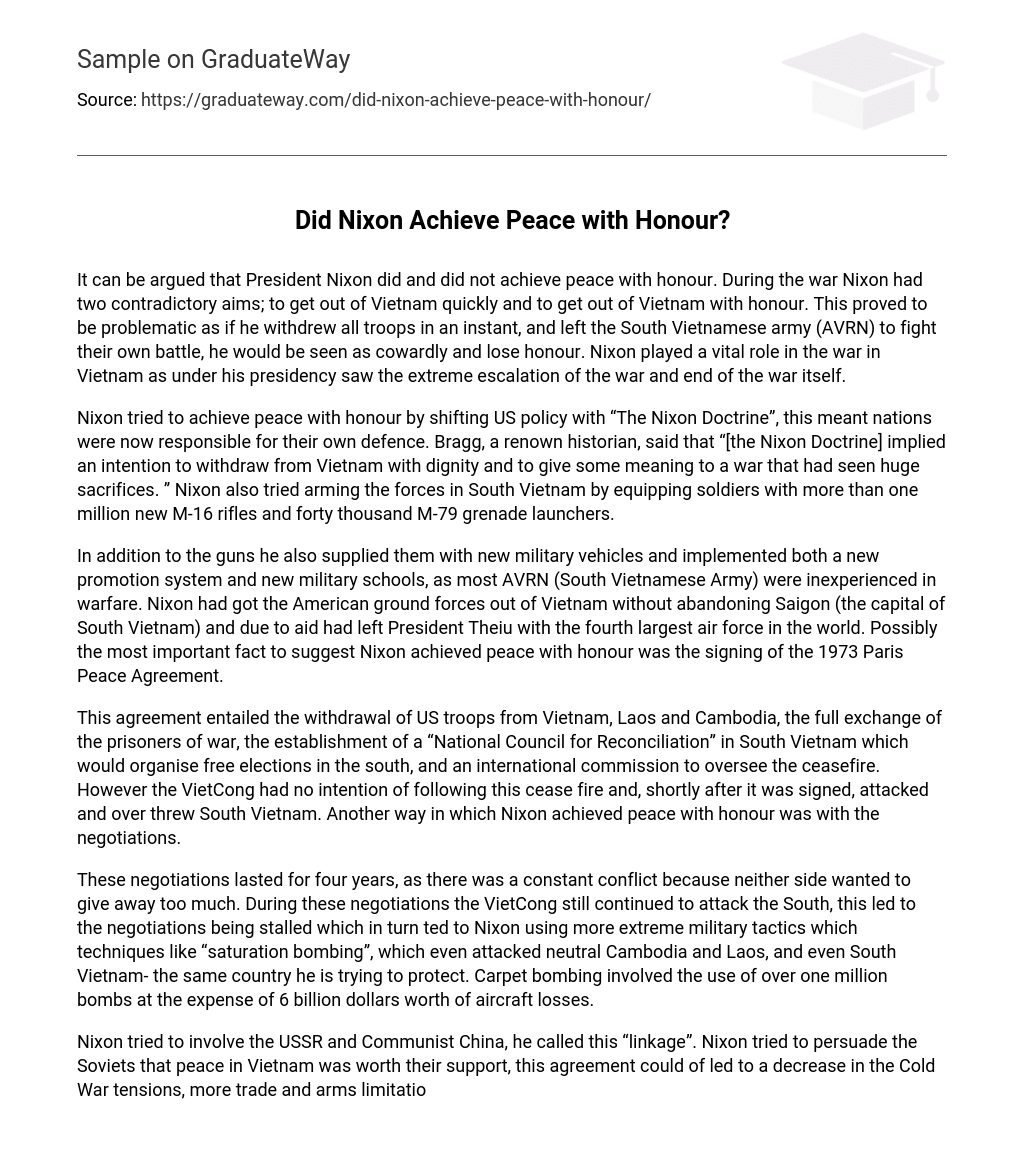It can be argued that President Nixon did and did not achieve peace with honour. During the war Nixon had two contradictory aims; to get out of Vietnam quickly and to get out of Vietnam with honour. This proved to be problematic as if he withdrew all troops in an instant, and left the South Vietnamese army (AVRN) to fight their own battle, he would be seen as cowardly and lose honour. Nixon played a vital role in the war in Vietnam as under his presidency saw the extreme escalation of the war and end of the war itself.
Nixon tried to achieve peace with honour by shifting US policy with “The Nixon Doctrine”, this meant nations were now responsible for their own defence. Bragg, a renown historian, said that “[the Nixon Doctrine] implied an intention to withdraw from Vietnam with dignity and to give some meaning to a war that had seen huge sacrifices. ” Nixon also tried arming the forces in South Vietnam by equipping soldiers with more than one million new M-16 rifles and forty thousand M-79 grenade launchers.
In addition to the guns he also supplied them with new military vehicles and implemented both a new promotion system and new military schools, as most AVRN (South Vietnamese Army) were inexperienced in warfare. Nixon had got the American ground forces out of Vietnam without abandoning Saigon (the capital of South Vietnam) and due to aid had left President Theiu with the fourth largest air force in the world. Possibly the most important fact to suggest Nixon achieved peace with honour was the signing of the 1973 Paris Peace Agreement.
This agreement entailed the withdrawal of US troops from Vietnam, Laos and Cambodia, the full exchange of the prisoners of war, the establishment of a “National Council for Reconciliation” in South Vietnam which would organise free elections in the south, and an international commission to oversee the ceasefire. However the VietCong had no intention of following this cease fire and, shortly after it was signed, attacked and over threw South Vietnam. Another way in which Nixon achieved peace with honour was with the negotiations.
These negotiations lasted for four years, as there was a constant conflict because neither side wanted to give away too much. During these negotiations the VietCong still continued to attack the South, this led to the negotiations being stalled which in turn ted to Nixon using more extreme military tactics which techniques like “saturation bombing”, which even attacked neutral Cambodia and Laos, and even South Vietnam- the same country he is trying to protect. Carpet bombing involved the use of over one million bombs at the expense of 6 billion dollars worth of aircraft losses.
Nixon tried to involve the USSR and Communist China, he called this “linkage”. Nixon tried to persuade the Soviets that peace in Vietnam was worth their support, this agreement could of led to a decrease in the Cold War tensions, more trade and arms limitations. Nixon even told Communist China that they could join the UN. Although the majority of these negotiations were carried out by Henry Kissinger (Nixon’s Secretary of State). On the other hand it can be argued that Nixon did not achieve peace with honour at all.
There are many points that help prove this but possibly the strongest is that the 1975 attack on South Vietnam by the VietCong managed to conquer the whole of the South and unite it under Communism. Two years after the signing of the Paris Peace Agreement the VietCong launch ac attack which quickly over ran the country, in April Saigon was captured and the whole of Vietnam was united under Communism. Another reason how Nixon did not achieve peace with honour was that after American forces left a third of a million civilians were “re-educated” in which were essentially concentration camps.
In these camps malaria, dysentery, torture and even executions were common. Another problem that arose from the withdrawal of the US was the amount of half US half Vietnamese “Amerasians” who were treated as out casts and often had to turn to prostitution. Finally another big reason how Nixon failed at getting peace with honour was the Cambodia and Laos has both become communist, probably due to the amount of bombing that occurred in Cambodia (under “saturation bombing”) had helped communism establish itself, and a knock on effect was the taking of Laos.
In conclusion Nixon did not achieve peace with honour, although he did try. Effects like concentration camps, the establishment of communism in two other countries and the amount of Amerasian outcasts caused peace with honour to become hard to see. Nixon succeeded in withdrawing his troops from Vietnam but failed to gain honour as he left the war ravaged country.





